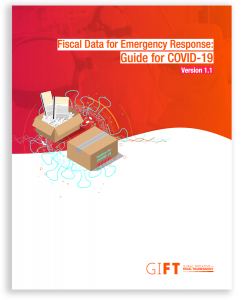
Dealing with the emergence of the Covid-19 pandemic requires an exceptional effort from society and government, which certainly includes public finances. We have already witnessed endeavors of historic dimensions that governments have put together to address the public health and economic crises caused by the disease, including reallocation of budget resources to the health sector and launching ambitious stimulus plans as countercyclical measures. Such drastic financial measures pose significant transparency challenges. Gathering and publishing -quality and timely- information is essential to mitigate the risks that can complicate internal and external monitoring and can be a culprit for mismanagement, corruption, and unforeseen fiscal risks. Transparency measures should contemplate the users’ needs of information, both internal, who will seek to use the data for decision-making, and external, who require the data to provide feedback, monitor implementation and foster accountability.
With the objective of continuing and deepening reflection and facilitate further guidance for implementation, the GIFT Network hosted a series of online events where stewards and partners were able to share their perspectives and lessons learned about fiscal openness (transparency and engagement) in times of emergency and participated in the co-creation of the Fiscal Data for Emergency Response: Guide for COVID-19 that is presented below.
Download the Fiscal Data for Emergency Response: Guide for COVID-19 1.1
View the consultation version 1.0 of the Guide
Resources from the process
Blog post 1. Fiscal Transparency in Times of Emergency Response: Reflections for Covid-19
Date: March 19, 2020

Date: May 5, 2020

Blog post 3. The impact of COVID19 on fiscal transparency and public participation
Date: June 23, 2020

Webinar 1. Reflections and recommendations for fiscal openness in times of emergency: Budget management adjustments for Covid-19
Date: April 7, 2020
Experts reflected on measures to make the most of the available resources,including necessary management adjustments and how open government methods can support better-decision-making during the emergency and post-emergency response. Within this context, the panelists analyzed the possibilities of existent classifications, internal financial management information systems, procurement systems, public reports and open data availability in different regards, as well as proposed options to track resources management and engage the community through online and offline channels.
– Lorena Rivero del Paso presentation / Global Initiative for Fiscal Transparency
– Sailendra Pattanayak presentation / International Monetary Fund
– Lindsey Marchessault OCP resources / Open Contracting Partnership
– Jason Lakin presentation / International Budget Partnership
– Blair Glencorse Twitter thread / Accountability Lab
While the aforementioned blogpost on Fiscal Transparency in Times of Emergency Response: Reflections for times of Covid-19, presents some initial questions to guide the identification of relevant data, during this session, participants collaborated in identifying specific datasets that are important to make available to track: 1) emergency spending to prevent, detect, control, treat, and contain the virus, 2) stimulus packages for countercyclical actions to reactivate the economy and support affected people and sectors, and 3) financing needs to ensure the financial requirements of the government during the emergency and for the stimulus measures.
After the identification of datasets, participants together related detailed data fields necessary for select priority datasets.
The results of this co-creation workshop supported the development of guidance for fiscal transparency measures in emergency responses.
• Workshop in Spanish
Date: April 9, 2020
25 Covid-19 data sets mapped
Participants: ACIJ Argentina, CIEP Mexico, Citizen Observatory of Fiscal Transparency Costa Rica, Fiscal Observatory Foundation Chile, International Budget Partnership, Inesc Brasil, Innovaap Costa Rica, Ministry of Finance from Argentina, Ministry of Finance from Costa Rica, Ministry of Finance from Mexico, Open Contracting Partnership, Open Data Charter, Planning and Budget Office from the Presidency of Uruguay, Ubicuo Mexico.

• Workshop in English
Date: April 20, 2020
30 Covid-19 final data sets mapped from both workshops
Participants: Asia Dalit Rights Forum, CABRI, Centre for Budget and Governance Accountability, CivicDataLab, Connected Development, Department of Budget and Management of the Philippines, Europe Foundation, GIZ (Benin), Institute of Public Finance from Croatia, International Budget Partnership, Ministry of Finance of Georgia, Federal Ministry of Budget and National Planning of Nigeria, Ministry of Finance of Mongolia, National Campaign on Dalit Human Rights, National Treasury of South Africa, Open Government Partnership, PEFA Secretariat, Public Service Accountability Monitor, Imali Yethu, Studies in Poverty and Inequality Institute (SPII).



